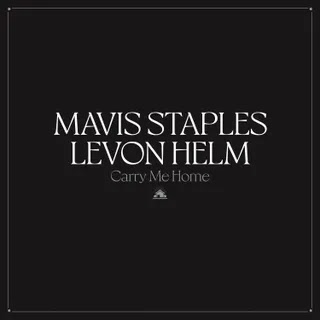Captured live a year before Helm’s death, this reunion of old friends and kindred icons is a testament to perseverance, faith, and mighty backing bands.
By the summer of 2011, both Mavis Staples and Levon Helm—dual icons of the ’70s then newly in their 70s—were basking in late-career renaissances. Staples had inked a deal with the label Anti- less than a decade earlier, launching a formidable run of records that funneled her gospel origins, soul might, and status as a civil rights mainstay into singular hour-long sermons. You Are Not Alone, her Jeff Tweedy-produced triumph, had just introduced her to a new generation. And Helm, a decade after a throat-cancer diagnosis, had regained control of his gritty Southern warble to make two occasionally great records that corralled his Arkansas upbringing and broad rock experience. After the post-millennial folk revival, Helm felt like a hero returning to claim his status. So when the old friends reunited at Helm’s place in Woodstock in May 2011 to rehearse and perform, the premise was clear—they had made it separately, but they were here to celebrate together.
Helm, at least, had the good sense to get behind the cannonball of Staples’ fiery voice, not in front. On Carry Me Home—a 12-track document of their performance that Friday night in Helm’s Barn, backed by a powerhouse tandem of their combined bands—Helm remains largely in the corners. He adds harmonies of ragged glory, only taking the lead briefly during an inevitable and sauntering finale of “The Weight.” But his drumming is unmistakable, a jolly canter that seems to bask in the glow of Staples’ command. From start to finish, she leads these songs of resilience and long-term redemption with a minister’s conviction. The dozen-plus musicians around her—including her sister Yvonne and Helm’s daughter, Amy—became her de facto choir. Carry Me Home is a jubilant lesson in living history.
Politics are paramount here. Staples and Helm rendezvoused, after all, a little more than two years into Barack Obama’s first presidential term, when the Tea Party and racist birthers were still ascendant. Staples considers all three in the sardonic verse she adds to “This Is My Country,” a new American anthem Curtis Mayfield penned four decades earlier while still in the Impressions. Opening the album, it doubles as a joyous fuck-off and wry come-on-in. Toward the end, their darkly funky take on Bob Dylan’s “Gotta Serve Somebody” begins to suggest a warning. As Staples repeats the titular mantra and ticks off all the things her Lord is to her (“a mighty good doctor… a lawyer”), she seems to be taunting the Christian right wing, daring them to tell her about values.
Consider just how astonishing and galvanizing it must have felt for Helm, the white Southerner, and Staples, the scion of a Black Mississippi native, to witness that recent election after the toil of the civil rights era. (Staples was once arrested at gunpoint while crossing into Memphis.) Carry Me Home cherishes progress, however slow or imperfect it may be. Where Nina Simone made the freedom of “I Wish I Knew How It Would Feel to Be Free” sound like some faraway dream, Staples—buttressed by blaring horns and quilted harmonies—roars with a gusto that suggests she’s almost there, that it will soon be hers. An astounding a cappella rendition of the hymn “Farther Along” deals frankly with death and heaven, but it has just as much to say about the aspirational quests of the living—freedom, happiness, community.
The gospel songs here speak to that same perseverance, that trust in reaching better days by whatever means necessary. Staples is a longtime master of making religious music feel ecumenical, as wide as the world’s problems. Carry Me Home is no different. Her delightful run through “When I Go Away,” written by Helm’s ace guitarist Larry Campbell, finds release and salvation, not fear, in the great beyond. Lifted from the Babylon of the Old Testament, “Hand Writing on the Wall” is an imprecation against the powerful and wicked, serving notice that they will eventually fall. Staples turns the promise into a party, exalting in overthrows to come.
Much has changed, of course, in the decade since Staples and Helm reunited for this set in Woodstock. Less than a year later, Helm died in a New York hospital, losing his battle with throat cancer after 28 radiation treatments. Cancer also took Yvonne Staples—a force of her own, even at her sister’s side—six years later. But the real tragedy and the true impact of this set stem from how current it feels now and how it will likely remain that way. Staples’ odes to faith and survival, as well as her quips about bad politics, are as relevant now as they were then, if not more.
“I’m only halfway home,” she sings during “Wide River to Cross,” the big band lifting behind her. “I’ve got to journey on.” It’s a Buddy and Julie Miller song, presumably about heavenly ascendance. But surrounded by family and friends, Staples grounds it here on earth, making it about the push for everyone’s progress. Make no mistake: This is fight music, rendered with soul strong and sweet.



0 comments:
Post a Comment